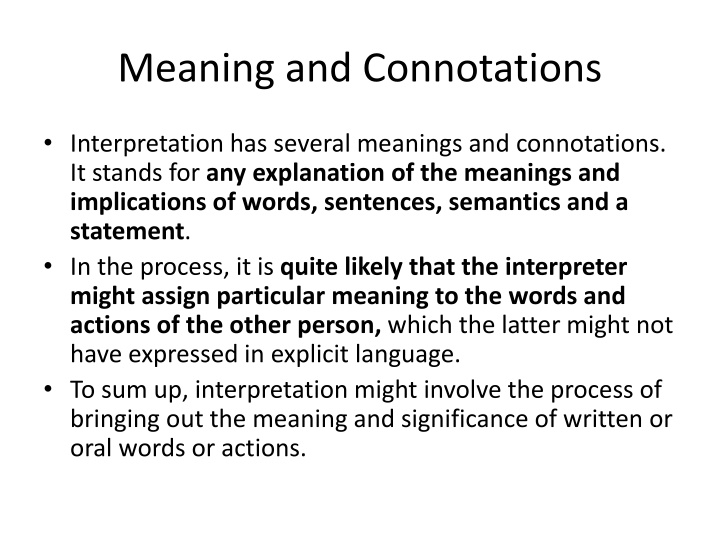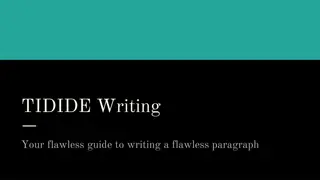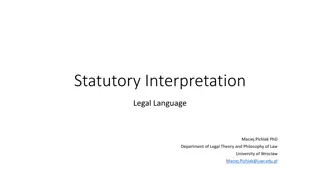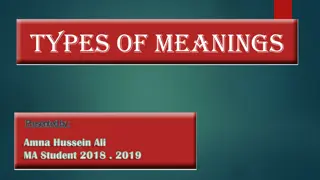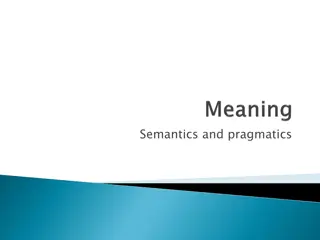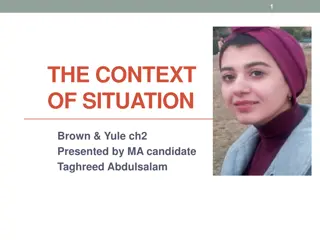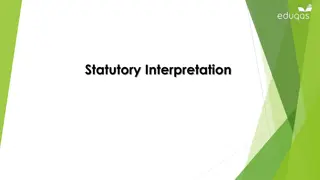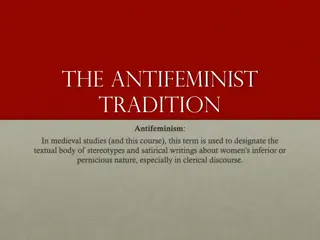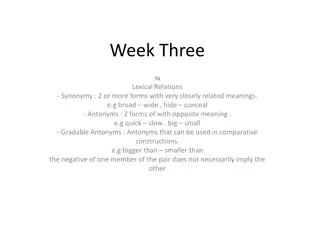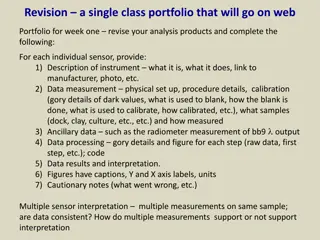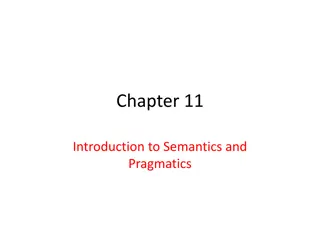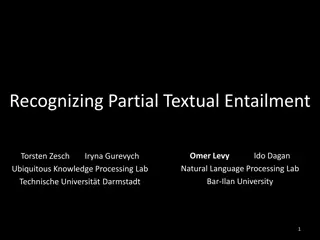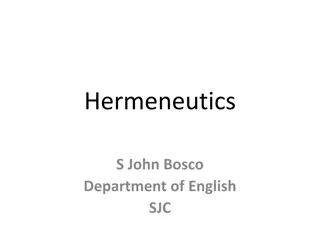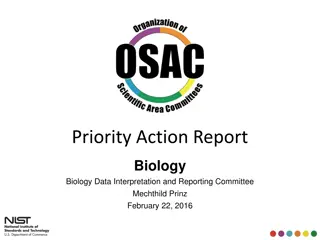Unveiling the Art of Interpretation: From Textual Meanings to Contextual Significance
Interpretation delves into the meanings and implications of words, sentences, and classical texts, bringing out their significance. It involves decoding complex ideas, separating temporal and perennial thoughts, and revealing contemporary relevance. Different approaches like textual and contextual are used to interpret and understand various texts.
Download Presentation

Please find below an Image/Link to download the presentation.
The content on the website is provided AS IS for your information and personal use only. It may not be sold, licensed, or shared on other websites without obtaining consent from the author.If you encounter any issues during the download, it is possible that the publisher has removed the file from their server.
You are allowed to download the files provided on this website for personal or commercial use, subject to the condition that they are used lawfully. All files are the property of their respective owners.
The content on the website is provided AS IS for your information and personal use only. It may not be sold, licensed, or shared on other websites without obtaining consent from the author.
E N D
Presentation Transcript
Meaning and Connotations Interpretation has several meanings and connotations. It stands for any explanation of the meanings and implications of words, sentences, semantics and a statement. In the process, it is quite likely that the interpreter might assign particular meaning to the words and actions of the other person, which the latter might not have expressed in explicit language. To sum up, interpretation might involve the process of bringing out the meaning and significance of written or oral words or actions.
Meaning and Connotations (contd.) In the present context of our study, the term interpretation is being used in the more specific context of a classical text. It is an attempt to bring out the meaning and central significance of a classical text. Here the term classic is taken as a text of the highest quality and of outstanding merit of its own kind. So the term interpretation could be defined as an attempt at reading or rendering a classical text to construe its meaning and significance.
Why Interpretation? There are several reasons why interpretation has developed as a distinct discipline. One, any classical text involves far more complexities than its simple literal meaning is likely to convey. Such a text could only be made more accessible in terms of its meaning and significance to the readers through an act of interpretation. Two, there have been several occasions in human history when a classical thinker presents her/his message through a text in a coded form out of fear for being persecuted by affected rulers/groups/individuals. It is for the interpreter to decode the meaning of the message in more intelligible terms for the readers.
Why Interpretation? (contd.) There might be other texts which might have put the complex ideas in a terse and condensed form. Brahmsutra and Upanishads and a host of other texts can be sited as some of the examples. Three, a classical text always contains thoughts of both temporal and perennial nature. So it is up to the interpreter to separate the two like the chalk and the cheese.
Why Interpretation? (contd.) It is through the act of interpretation that the contemporary relevance of such classical texts is brought to the fore. Charles Taylor, a leading political philosopher, rightly observes that the job of an interpreter is to bring to light an underlying coherence or sense even from a text which might remain confused and cloudy .
Approaches to Interpretation Broadly speaking, different approaches could be put into the two categories of textual and contextual approaches to interpretation. Textual Approach: It insists on a close and sensitive reading of any text under study and interpretation. Textual approach is predicated on the belief and assumption that the meaning and significance is contained in the text itself. Hence, one could get the required result in terms of its meaning and message by meditating on it. Even the intention of the author , which could be a major key to its understanding, is also inherent in the text.
Approaches to Interpretation: Textual Approach (contd.) Hence, there is no need to go beyond the text to examine the authorial intention, or his surrounding environment or even his compulsions, psychological or otherwise. Their argument goes even beyond this point. They insist that any attempt to dig out author s autobiographical details or her/his motives and intention might even contaminate the meaning and significance of the text.
Textual Approach (contd.) In fact, the proponents of this school have strong faith in the autonomy of the text. They assert that the classics contain timeless perennial and trans-historical truth. Hence they are free from spatio-temporal limitations.
Textual Approach: Views of Leo Strauss(1899-1973) Leo Strauss was a strong critic of historical and positivist school. Historicism was premised on the belief that values are primarily relative and context- specific. Hence, they are basically determined by history. The positivists also do not attach much importance to values as they are not empirically verifiable. Both historicists and positivists assert that it is not possible to have the knowledge of the good which could hold true both universally and perennially. Leo Strauss was critical of such approaches. He and the scholars of his school are firmly of the opinion that political philosophy is essentially a context-free enterprise.
Views of Leo Strauss (contd.) Since there do exist universal and trans-historical principles which could be apprehended by a close and deep study of classical texts of political philosophy such close and sensitive study could yield right perspectives on the nature of the good political order. This might be a challenging task, but it is worth pursuing as it is likely to offer good and relevant clues even for the problems confronting the present generation.
Views of Leo Strauss (contd.) For this one has to rely on what these classical thinkers have to say, directly or indirectly interpreting their own terms and premises rather than depending on any extraneous considerations. Strauss insists that such a study is bound to be free from historicism , relativism and belief in progress . However, Strauss never meant that these texts could be studied in isolation or they are totally self- sufficient. His intellectual position was that in course of their studies, some additional information like the author s intellectual tradition, the contemporary lexicon, their target groups both for dissuasion and persuasion, etc., might be needed.
Views of Leo Strauss (contd.) But he insisted that all this would have to be integrated in the framework supplied by the author herself/himself. Thus, one has to understand the context as the author did and not impose one s own perception on it. Therefore, the text would to be interpreted on the basis of the clues derived from the text itself and not from all the extraneous factors. According to Leo Strauss, classical political philosophy contains both exoteric and esoteric truth. Exoteric truth stands for the kind of truths which are more context-specific and could be easily grasped by the general masses; whereas esoteric truth is primarily context-free and is likely to be understood by the small number of people with specialized knowledge.
Three Reasons for such Mixing of Truth in a Classical Text i. Fear of persecution at the hands of the rulers or the dominant groups; Need for practical politics; and iii. Need for required education for understanding truth from lower to higher level. Leo Straus further asserted that the major problem of modern political philosophy is that it characterized classical political philosophy as being unrealistic and hence, the goal set by it is not achievable. To be more specific, classical political philosophy subordinated politics to moral or intellectual virtues whereas Machiavelli subjected virtues to the needs of politics. ii.
Concluding Observations of Leo Strauss Leo Strauss concludes by saying that in human situation there is persistence of the permanent problems and also alternative solutions. Therefore, a detailed investigation into classical political theory could be of great help not only in understanding our present human predicament, but it also might point a way out.
Views of Plamenatz In his book, Man and Society (volume 1), Plamenatz concedes that every thinker, however abstract s/he might be, is deeply influenced by the surrounding environment. But it does not mean that any one undertaking the study of these theories would have to necessarily involve herself/himself in the analysis of the circumstances surrounding these theorists and their theories. According to Plamenatz one has to make an attempt to understand what they have to say and not why they are saying so.
Views of Plamenatz (contd.) It is necessary to understand the nature of the lexicon the given theorist is using, the sense and meaning in which the words are being used. This point is illustrated by Plamenatz by citing the example of Thomas Hobbes and his Leviathan. We can get the sense of Hobbes by the perusal of his words, his terminology rather than going deep into the condition prevailing in England of his days. It is needed to know the sense in which he is using words like law , right , liberty , covenant , obligations and so on and so forth.
Views of Plamenatz and Others It is so, because, though a great thinker might use common language , s/he might use it with her/his own sense and meaning. Andrew Hacker and Allan Bloom also argue more or less on the same lines. Plamenatz underlines the fact that these classics deal with general and perennial principles, but they do so in such a manner and style which is particular to a particular author. Allan Bloom, on the other hand, asserts that political philosophy is nothing but continuous dialogues from different political philosophers.
Views of Plamenatz and Others (contd.) For example, to understand Rousseau, one has to go back to Plato. Hence, any detailed investigation into the socio-political context of Rousseau s ideas is irrelevant. To sum up, Leo Strauss is emphatic that the study of political philosophy is a non-historical endeavour and enterprise. Thus, all of them belonging to the textual group are one on the point that the classical texts should be studied and interpreted in the light of the general principles they contain rather than with heavy emphasis on their contextual background.
